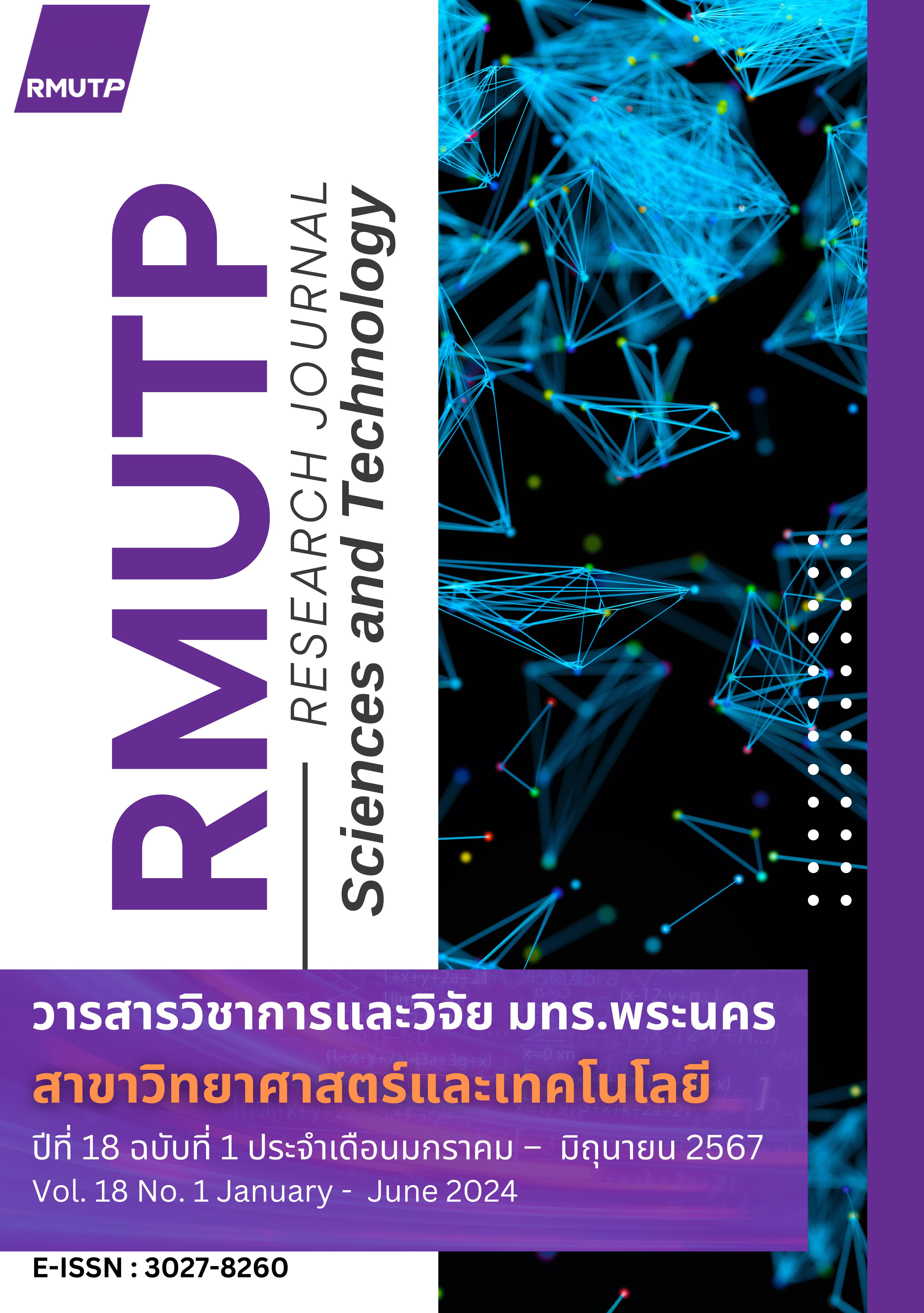Performance Evaluation of a Hybrid Evaporative Cooling – Vapor Compression Air Condition
Main Article Content
Abstract
A hybrid system combining an evaporative cooler and a traditional vapor-compression air-conditioner was investigated and evaluated its performance in this study. A 2.30m x 2.30m x 2.75m building was built at Suranaree University of Technology, Nakhon Ratchasima. A vapor-compression air-conditioner was installed in the building. Five different types of indirect evaporative coolers were built and installed in the building. They are a Maisotsenko (M) - cycle type, cross-flow with regeneration type, cross-flow without regeneration type, counter-flow with baffles type, and counter-flow without baffles type. The test results showed that the cross-flow without regeneration type provided the highest coefficient of performance (COP) and wet-bulb effectiveness compared with the other 4 types. Its maximum COP and wet bulb effectiveness were 11.68 and 0.97, respectively. This type was also easier to build because it is less complicated when compared to the others. Therefore, the cross-flow without regeneration type was chosen. It found that installing the evaporative cooler outside the building can reduce energy consumption by 30.77% compared with installing the cooler inside the building. It also found that intermittent water spraying on the cooling core is better than continuous water spraying 5 min spraying of water every 2 h can reduce the outlet air temperature of the cooler to about 8 °C.
Article Details

This work is licensed under a Creative Commons Attribution-NonCommercial-NoDerivatives 4.0 International License.
ลิขสิทธ์ ของมหาวิทยาลัยเทคโนโลยีราชมงคลพระนครReferences
Q. Chen, M. Kum Ja, M. Burhan, F. Hassan Akhtar, M. Wakil Shahzad, D. Ybyraiymkul, K. Choon Ng, “A hybrid indirect evaporative cooling-mechanical vapor compression process for energy-efficient air conditioning,” Energy Conversion and Management, Vol. 248, pp. 114798, 2021.
R. Tariq, N. Ahmed Sheikh, J. Xaman, A. Bassam, “Recovering waste energy in an indirect evaporative cooler – A case for combined space air conditioning for human occupants and produce commodities,” Building and Environment, Vol. 152, pp. 105-121, 2019.
D. Pandelidis, A. Cichon, A. Pacak, S. Anisimov, P. Drag, “Performance comparison between counter- and cross-flow indirect evaporative coolers for heat recovery in air conditioning systems in the presence of condensation in the product air channels,” International Journal of Heat and Mass Transfer, Vol. 130, pp. 757-777, 2019.
V. Jain, S.C. Mullick, Tara C. Kandpal, “A financial feasibility evaluation of using evaporative cooling with air-conditioning (in hybrid mode) in commercial buildings in India,” Energy for Sustainable Development, Vol. 17, pp. 47-53, 2013.
M. Wakil Shahzad, M. Burhan, D Ybyraiymkul, S. Jin Oh, K. Choon Ng, “An improved indirect evaporative cooler experimental investigation,” Applied Energy, Vol. 256, pp. 113934, 2019.
D. Bishoyi, K. Sudhakar, “Experimental performance of a direct evaporative cooler in composite climate of India,” Energy and Buildings, Vol. 153, pp. 190-200, 2017.
S.A. Nada, A. Fouda, M.A. Mahmoud, H.F. Elattar, “Experimental investigation of energy and exergy performance of a direct evaporative cooler using a new pad type,” Energy and Buildings, Vol. 203, pp. 109449, 2017.
J. Chua, W. Xu, Yijun Fu, H Huo, “Experimental research on the cooling performance of a new regenerative dew point indirect evaporative cooler,” Journal of Building Engineering, Vol. 43, pp.102921, 2021.
P. Patunkar, S. Dingare, “Performance investigations of cross flow indirect evaporative cooler,” Materialstoday PROCEEDINGS, Part 11, Vol. 47, pp. 2915-2918, 2021.
D. Pandelidis, A. Cichon, A. Pacak, Anisimov, P. Drag, “Counter-flow indirect evaporative cooler for heat recovery in the temperate climate,” Energy. Vol. 165, Part A, pp. 877-894, 2018.
D. Pandelidis, A. Cichon, A. Pacak, Anisimov, P. Drag, M. Drag, W. Worek, S. Cetin, “Performance study of the cross-flow Maisotsenko cycle in humid climate conditions,” International Communications in Heat and Mass Transfer. Vol. 115, pp. 104581, 2020.
H Kim, S Ham, D Yoon, J Jeong, “Cooling performance measurement of two cross-flow indirect evaporative coolers in general and regenerative operation modes,” Applied Energy. Vol. 195, Pages 268-277, 2017.
A.E. Kabeel, M. Abdelgaied, R. Sathyamurthy, T. Arunkum, “Performance evaluation and parameter sensitivity analysis of a membrane-based evaporative cooler with built-in baffles,” Applied Thermal Engineering. Vol. 208, pp. 118228, 2017.
R. Tariq, N. Ahmed Sheikh, J. Xamán, A. Bassam, “Recovering waste energy in an indirect evaporative cooler – A case for combined space air conditioning for human occupants and produce commodities,” Building and Environment. Vol. 152, pp. 105-121, 2019.
Y. Wan, Z. Huang, A. Soh, X. Cui, K. Jon Chua, “Analysing the transport phenomena of novel dew-point evaporative coolers with different flow configurations considering condensation,” International Journal of Heat and Mass Transfer. Vol. 170, pp. 120991, 2021.
S. Hossein Elahi, S.D. Farhani, “Increasing evaporative cooler efficiency by controlling water pump run and off times,” International Journal of Heat and Mass Transfer. Vol. 127, pp. 105525, 2021.
T. Theamtat, “Modeling and analysis of a hybrid evaporative cooling vapor compression air-conditioning,” Thesis M.Eng. (Mechanical and Process), Suranaree University of Technology, Nakhon Ratchasima, 2019.
C. T’Joen, Y. Park, Q. Wang, A. Sommers, X. Han, A. Jacobi, “A review on polymer heat exchangers for HVAC&R applications,” International Journal of Refrigeration. Vol. 32, pp. 763–779, 2009.
R. Boukhanouf, O. Amer, H. Ibrahim, J. Calautit, “Design and performance analysis of a regenerative evaporative cooler for cooling of buildings in arid climates,” Building and Environment, Vol.142, pp. 1-10, 2018.
2001 ASHRAE Fundamentals Handbook (SI), Chapter 6: Psychrometrics, 6.1–6.17. American Society of Heating, Refrigerating and Air-Conditioning Engineers (2002), Atlanta.
S. Thiangchanta, T. Anh Do, P. Suttakul, Y. Mona, “Energy reduction of split-type air conditioners using a pre-cooling system for the condenser,” Energy Reports, Vol. 7, pp. 1-6, 2021.


